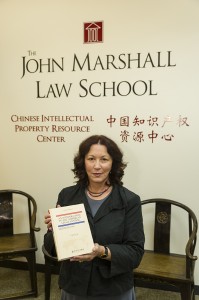 The relationships among the American political system, legal system and the individual are unfamiliar to many across the world, but Professor Diane S. Kaplan of The John Marshall Law School has written a book to make these dynamics understandable to Chinese students who come to the U.S. to receive a legal education.
The relationships among the American political system, legal system and the individual are unfamiliar to many across the world, but Professor Diane S. Kaplan of The John Marshall Law School has written a book to make these dynamics understandable to Chinese students who come to the U.S. to receive a legal education.
“An Introduction to the American Legal System,” is a constitutional law textbook that is based on questions and conversations Kaplan had with her Chinese students in Beijing and Changchun. “When I asked my students what they wanted to learn about American law, they told me they were most interested in our government and political systems, checks and balances, rights and duties, and the individual’s relationship with the government,” she said.
Kaplan said the book is written around the theme of “who decides legal, political, and individual matters—the individual or the government?” To illustrate this theme, she included cases about the Civil Rights movement, juvenile law, and political and legal controversies.
The book was prepared as a gift from The John Marshall Law School to the Chinese State Intellectual Property Office (SIPO) in recognition of their 20-year relationship in developing legal training exchange programs for Chinese and American students. The book is SIPO’s first official publication of an American law textbook and will only be available for sale and distribution by SIPO exclusively in China.
Kaplan taught in John Marshall’s Asian Alliance programs in Beijing and Changchun during a five-year period helping prepare Chinese intellectual property experts and attorneys to earn intellectual property LLM degrees. The courses are taught by John Marshall professors who provide six weeks of intensive training in lawyering skills and introductory legal concepts.
According to Kaplan, “The Chinese are not accustomed to the Socratic method of education that requires questioning by both the professor and the student.” In order to initiate class discussions, she chose cases and examples that would encourage debate. For example, Bush v. Gore was used to explain the electoral system and the power of the Supreme Court to make final decisions. Jones v. Clinton was used to explain executive immunity and the power of the individual to hold an American president accountable for private conduct.
Watergate issues were used to explain political and legal conflicts and the roll of the press in investigating government actions. Juvenile law cases were used because everyone has opinions about who makes decisions about how their children are raised and educated.
Using the Internet, Kaplan would go through articles and editorials from American newspapers with her students to show them how Americans not only are kept informed of government actions and court decisions but how they respond to them
Kaplan recalled how in one class session she covered Paris Hilton’s arrest, Justice Sandra Day O’Connor’s resignation and the reasons why state legalization of marijuana conflicted with federal law. The later issue was demonstrated by pantomime—not by Kaplan but by several of her students. It was those interactions that inspired her to write the book.
“I taught in China four times over a five-year period, and each time was a life-changing experience. I am so grateful,” Kaplan said. “And, I have enormous gratitude for the extraordinary opportunities and support Dorothy Li, director of our Asian Alliance Program, has provided me over the years.”
“I also thank Professor Kevin Hopkins for his unceasing advice and assistance in helping me learn how to teach our Chinese colleagues. Also, thanks to Yang “Melissa” Lu for her several years of work overseeing the production of the book, and my former research assistant, A.J. Young, for her proofreading and editing assistance.”


